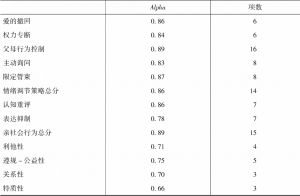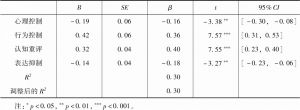论文
父母控制对高中生亲社会行为的影响:情绪调节策略的中介作用
摘要
家庭环境对个体亲社会行为的发展具有重要影响,其中父母控制是指父母在教养活动中用以控制、管理子女的较为稳定的行为方式,可分为心理控制和行为控制两个方面(Barber,Olsen,& Shagle,1994)。已有研究普遍认为心理控制是一种消极的控制方式,而行为控制在某些情况下具有一定的积极作用。本研究探讨了父母控制对高中生亲社会行为的双重效应,以及个体的情绪调节策略在上述关系中的中介作用。研究随机选取了342名学生进行问卷调查。结果表明,父母控制在预测子女亲社会行为时存在着双重效应。心理控制会抑制亲社会行为的发生,而行为控制则可以增强个体的亲社会倾向,且积极的情绪调节策略(认知重评)在行为控制与亲社会行为之间发挥了部分中介作用。
检索正文关键字
论文目录
-
一 引言
- (一)亲社会行为及影响因素
- (二)父母控制对亲社会行为的影响
- (三)情绪调节策略对亲社会行为的影响
- (四)父母控制、情绪调节策略和亲社会行为三者的关系
-
二 研究方法
- (一)被试
- (二)测量工具
- (三)数据处理
-
三 结果
- (一)共同方法偏差检验
- (二)量表信度及效度检验
- (三)父母控制、情绪调节策略和亲社会行为的性别差异
- (四)相关分析
- (五)回归分析
- (六)中介效应检验
-
四 讨论
- (一)父母控制和情绪调节策略对亲社会行为的影响
- (二)情绪调节策略的中介作用
- (三)父母控制、情绪调节策略和亲社会行为的性别差异
- (四)研究不足与展望
相关文献
宽容对小学生外化问题行为的影响:友谊质量、敌意归因的中介作用
程序公平性和结果有利性对儿童程序正义判断、结果满意度与权威接纳意愿的影响
查看更多>>>










